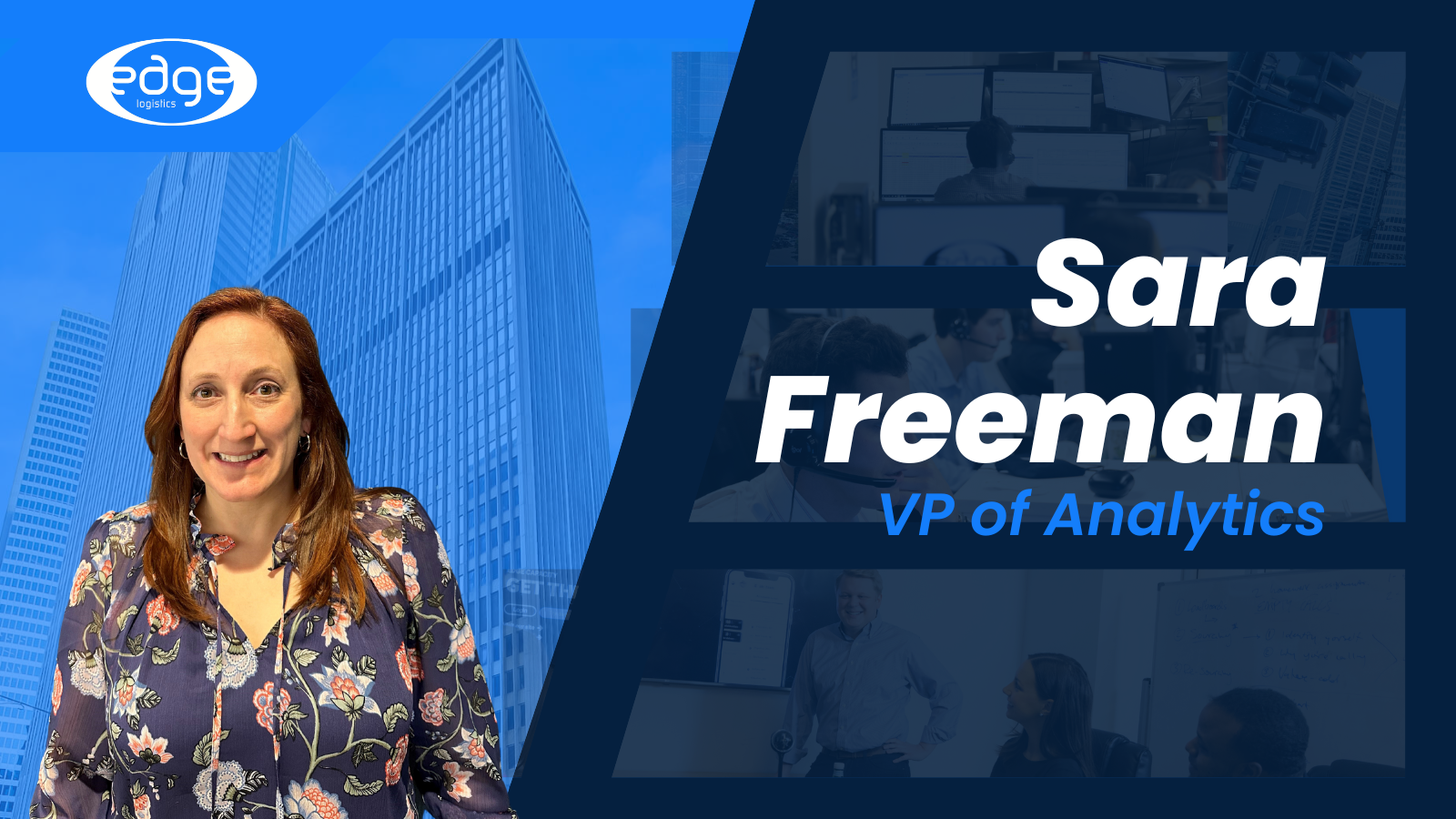Employee Spotlight: Sara Freeman, VP of Analytics, Master of Using Data to Tell a Story
 Maria Callegari
June 13, 2023
Maria Callegari
June 13, 2023

When it comes to data analytics, there’s no one better than Sara Freeman, our new VP of Analytics. Sara’s illustrious background in data, analytics, and logistics makes her an ideal candidate to help Edge Logistics continue to modernize and take advantage of new and existing technologies to better serve customers. We asked her about her experience, new role, and insights on the recent changes in analytics and tech.
How did you get into logistics and analytics?
Sara Freeman: Like most people, I stumbled into the industry. I stumbled into logistics first and then into analytics which probably isn’t typical for my path. I had experience in operations and process management, and when I first moved to Chicago, a friend suggested an AM role for a big logistics company. I figured out the role wasn’t right for me, but the company gave me an opening to try new paths — I became an accounts payable analyst and started getting more into Excel and analytics. When I began to understand the impact of data on operations and strategy, it was then that I realized I had finally found what I was meant to be doing. And I’ve been doing it ever since.
How has logistics analytics changed during your career?
Being able to tell a story with data is just as important as being able to analyze it — that hasn’t changed. There has always been an understanding that analytics is relevant, and when I got into the field, the term “big data” was all the buzz. In the past few years, though, customers and brokers have started to understand more about how data can define paths of clear expectations to create success.
With new technologies and automation tools, we’re able to capture more data at different moments in the bid, load, and relationship life cycle. We are smarter and more strategic in how we approach our customers and their freight — providing insights they may not even see yet.
I’m excited about the many great tools Edge has developed, and now it’s a matter of taking all that great data and really using it to push the business forward.
What are your plans for your role?
Edge has solid fundamentals when it comes to data. We look at the business metrics daily and have good data-collecting technology to continue growing our data set. It’s now about bringing all the great data sources together to work smarter and find opportunities for growth and efficiency.
As mentioned, my background is primarily in operational management, so I believe understanding how data is collected and used currently is the best way to understand a business and how BI can play a role. I encourage all of my analysts to learn the TMS and the customer/carrier roles; go and sit on the floor among your colleagues to see what’s happening. You can’t tell a story with the data if you don’t know how that data impacts the floor, so my first step is really understanding existing processes.
Then really making sure we have a universal language around metrics and goals. Next, it will be about getting our data centralized — a data lake and then a semantic layer. From there, we’ll be able to really start running. Luckily, I am familiar with the TMS and other tools Edge has for the fundamentals, so we can run through that quickly and start getting to the fun stuff faster.
It’s amazing to see how hungry everyone is to use the data here — getting everyone to row the boat in the same direction will be a big first step. Then it is on to the customer and lead impact; creating value-add insights will allow us to develop deeper relationships and establish new ones. Then to the next level of machine learning and AI.
What challenges do you foresee in your role, and how do you plan to address them?
Will (Kerr, CEO) and Blaine (Barnett, President) are really expanding our experienced leadership team, which is great and is all the more reason for a common language around our data and metrics. I think it is always a challenge to make sure that we have a single source of truth and don’t get reports or metrics muddied by exceptions or distractions.
Pricing is a challenge for any company — especially in markets like this one. Helping our great pricing team to understand their impact will be a lot of heavy lifting on the collection and cleaning side of data, but with the right approach, it will go a long way toward agility and automation in our pricing.
Logistics is still very much a people industry. It’s about working with others who don’t live in the data and visualizations like I do without creating analysis paralysis, which is a very real thing. Everyone wants data to be sexy and fun, and it can be, but it's pointless if you don’t know how to use it to improve your teams’ daily activities, your customers’ and carriers’ experience and overall growth.
About the Author


